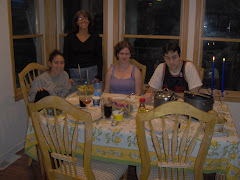Jul 9, 2009
9 Ways That Parents Don't Parent Teenagers
Kemuel Ronis
To be friends-
Being a parent does not mean being your child’s best buddy. Your role is to love them, guide them, and to be the authority in the household.
To not have regular chores-
Being a family means that everyone helps. This habit should have started much younger than the teenage years. It also means that your children should not have to be constantly reminded about what they should do around the house. If you don’t know how kids should be contributing, then ask for advice or post a question: that’s what I’m here for.
To allow whining-
This wears you down and teaches your child poor interaction skills.
To give in-
Teenagers have basically two weapons: withdrawal of love and being sullen. The hard work of being a parent means saying no. If you give in by being manipulated whenever your child does not get his or her way, then the battle is over. You might as well just hand over your paycheck, credit cards and car keys now…
To give too much-
This is a tough one because our culture supports instant gratification and mass commercialism. Spoiling your child by buying them everything they want is one of the worst things that you can do as a parent.
To clean up their mistakes-
One of the most powerful and effective ways to learn and change behavior is by experiencing the consequences of ones choices. Parents who always make everything alright are doing their children a great disservice.
To be absent or unavailable-
Even though our culture says that teenagers don’t want to be around their parents, the truth is that they need and want your time.
To be the cool parent-
When parents make decisions about their children in order to be known as the cool parent, disaster is not far behind. Underage drinking parties in your home do not make you cool, just stupid. I won’t even mention getting high…
To not listen-
Being a parent means really paying attention to what your child is saying and sometimes not saying. Listening means being calm, considering your son or daughter’s words, taking their problems seriously, and being respectful.
To be friends-
Being a parent does not mean being your child’s best buddy. Your role is to love them, guide them, and to be the authority in the household.
To not have regular chores-
Being a family means that everyone helps. This habit should have started much younger than the teenage years. It also means that your children should not have to be constantly reminded about what they should do around the house. If you don’t know how kids should be contributing, then ask for advice or post a question: that’s what I’m here for.
To allow whining-
This wears you down and teaches your child poor interaction skills.
To give in-
Teenagers have basically two weapons: withdrawal of love and being sullen. The hard work of being a parent means saying no. If you give in by being manipulated whenever your child does not get his or her way, then the battle is over. You might as well just hand over your paycheck, credit cards and car keys now…
To give too much-
This is a tough one because our culture supports instant gratification and mass commercialism. Spoiling your child by buying them everything they want is one of the worst things that you can do as a parent.
To clean up their mistakes-
One of the most powerful and effective ways to learn and change behavior is by experiencing the consequences of ones choices. Parents who always make everything alright are doing their children a great disservice.
To be absent or unavailable-
Even though our culture says that teenagers don’t want to be around their parents, the truth is that they need and want your time.
To be the cool parent-
When parents make decisions about their children in order to be known as the cool parent, disaster is not far behind. Underage drinking parties in your home do not make you cool, just stupid. I won’t even mention getting high…
To not listen-
Being a parent means really paying attention to what your child is saying and sometimes not saying. Listening means being calm, considering your son or daughter’s words, taking their problems seriously, and being respectful.
Subscribe to:
Post Comments (Atom)



I completely agree with this post! In my experience as a teacher, it seems difficult for parents to view their child objectively. Now I can only imagine how difficult that is (I'm not a parent myself), but it seems like a lot of kids would really benefit from a parent who was able to assess their child's behavior withtout blinders.
ReplyDeleteJenn
Thanks for the comment! Like you, I am also a teacher and I am constantly surprised by parents who don't know their own kids. By the time mine were 5 or 6 their personalities and habits were very clear to me.
ReplyDeleteI also agree with this, even though I am not a parent. Your kids are lucky to have such an insightful dad. Watch out, Dr. Phil!
ReplyDeleteI also think the teen problem checklist for parents to vote on is a great way to get readers involved. (Now that I have finally commented on a blog, I can't stop! :)
ReplyDeleteAlthough I am not a parent to children, I am an adoptive mother to two awesome cats. I think your points about whining and giving in relate to them as well. When I give in because my cats whine for food, they keep waking me up earlier and earlier (6:30am, 6am, 5:30am, etc). It's very manipulative and it wears me down!
ReplyDeleteI have a question about the first item on the list of straightforward advice. What if a child has trouble in school? Should a parent simply let them fail or should they help them out with their work?
ReplyDeleteThanks for all of the comments!
ReplyDeleteNicole, you gotta take a hard line with those cats! Take their kitty cell phones away until they stop whining!!
Memoirs of Meanness, you asked a great question. First of all my assumption is that there is no learning disability involved. I think it is appropriate to give help and guidance when kids are in elementary school, as long as you are not actually doing their work or projects for them.
Once kids hit 6th grade (or earlier) a parent's job is to set expectations for their child's academic performance, impose consequences if those standards are not met and then step out of the picture. Almost every school offers all kinds of peer tutoring and teacher tutoring so if a student needs additional help outside of the classroom it is available. (There are also all kinds of professional services-)
For teenagers, school should be their responsibility and not something that a parent has to be involved in-
Getting a failing grade in school, or failing in life at something, can teach valuable lessons, especially when there is an unpleasant outcome as a result.